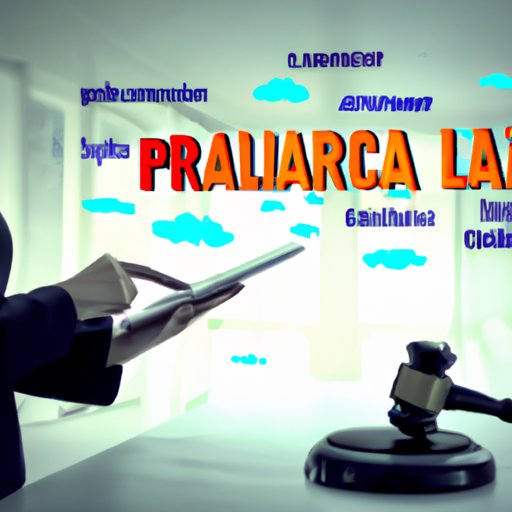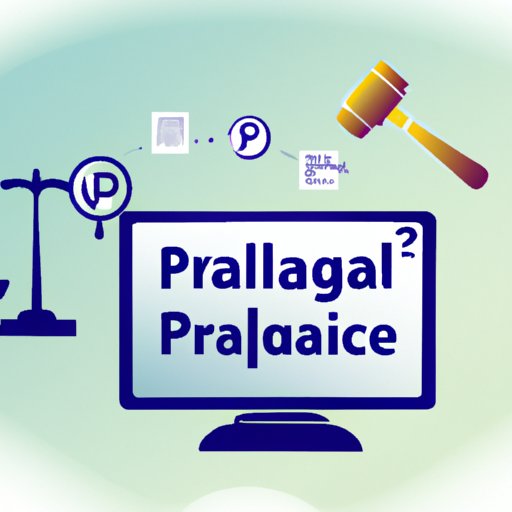Introduction
Paralegal technology is a form of legal automation that is revolutionizing the way lawyers and paralegals work. By using technology to automate certain tasks, paralegals can save time and money while still providing quality services to clients. This article will explore what paralegal technology is, how it is changing the legal profession, and what the future of law practice may look like.
A Guide to Paralegal Technology for Beginners
Before we dive into the world of paralegal technology, it’s important to understand the role of a paralegal in the legal field. A paralegal is a professional who assists attorneys with legal research, writing, document preparation, and other administrative tasks. Paralegals must have a strong understanding of the law and be able to interpret legal documents accurately. They are an integral part of the legal team and play a key role in helping attorneys provide quality representation to their clients.
In order to become a paralegal, one must typically complete a postsecondary program in paralegal studies or a related field. Programs vary in length from two-year associate degrees to four-year bachelor’s degrees. In addition, many employers require paralegals to pass a certification exam prior to being hired.

How Paralegal Technology is Changing the Legal Profession
Paralegal technology has changed the way lawyers and paralegals do their jobs. According to a study by the American Bar Association, “automation and artificial intelligence (AI) are transforming the traditional roles of paralegals and other legal professionals.” This means that they are now able to use technology to automate certain tasks, such as legal research, document preparation, and client communication. As a result, these tasks are becoming more efficient and cost-effective.
Another trend in the legal field is the use of cloud computing. This allows paralegals to store and access documents in the cloud, which can help them save time and money. Additionally, digitalization of documents is becoming increasingly popular. This process involves scanning paper documents and converting them into digital formats, which can be stored and accessed more easily.

Paralegal Technology: The Future of Law Practice
As technology continues to advance, it is likely that online legal services will become more popular. These services allow clients to access legal advice without having to physically visit a lawyer’s office. Remote working is also becoming increasingly prevalent in the legal profession, which enables lawyers and paralegals to work from anywhere in the world.
The potential for increased efficiency is also very real. With the help of paralegal technology, lawyers and paralegals can automate many of their routine tasks, such as document management, legal research, and client communication. This can help them reduce costs and improve productivity, leading to better client service.
An Overview of Paralegal Technology Tools and Resources
There are several tools and resources available to paralegals looking to make the most of paralegal technology. Case management software is a popular tool that allows paralegals to manage their cases more efficiently. It helps them track deadlines, organize documents, and communicate with clients.
Electronic research tools are also becoming increasingly popular. These tools allow paralegals to quickly search for information and find relevant court decisions. Document automation is another useful tool, as it helps paralegals create documents faster and more accurately.

The Impact of Paralegal Technology on the Legal Industry
Paralegal technology is having a significant impact on the legal industry. One of the most obvious benefits is cost savings. By automating certain tasks, paralegals can reduce their workload and free up time, allowing them to take on more cases and generate more revenue. Additionally, improved productivity leads to better client service, as paralegals can focus on providing high-quality advice and representation.
Paralegal technology is also having a positive effect on job satisfaction. According to a survey conducted by the National Federation of Paralegals, “the majority of paralegals reported that their job satisfaction has increased since technology was introduced to their workplace.” This suggests that paralegals are finding their roles more rewarding and fulfilling since they are able to utilize technology to make their jobs easier.
Trends in Paralegal Technology: What’s Next?
As technology continues to evolve, so too does the world of paralegal technology. Automated legal document assembly is one area that is gaining traction. This process involves creating legal documents automatically based on a set of predetermined rules. Machine learning algorithms are also being used to predict outcomes in legal cases, allowing paralegals to make more informed decisions.
Blockchain technology is another trend that is gaining momentum in the legal industry. This technology is being used to store and share data securely, making it ideal for sensitive legal matters. Additionally, smart contracts are becoming increasingly popular, as they can help streamline transactions and reduce costs.
Conclusion
Paralegal technology is revolutionizing the legal profession by automating certain tasks and providing cost savings. Paralegals are now able to take advantage of tools and resources that can help them streamline their workflow and improve the quality of their services. Additionally, new trends such as automated document assembly, machine learning algorithms, and blockchain technology are paving the way for the future of law practice.
(Note: Is this article not meeting your expectations? Do you have knowledge or insights to share? Unlock new opportunities and expand your reach by joining our authors team. Click Registration to join us and share your expertise with our readers.)
